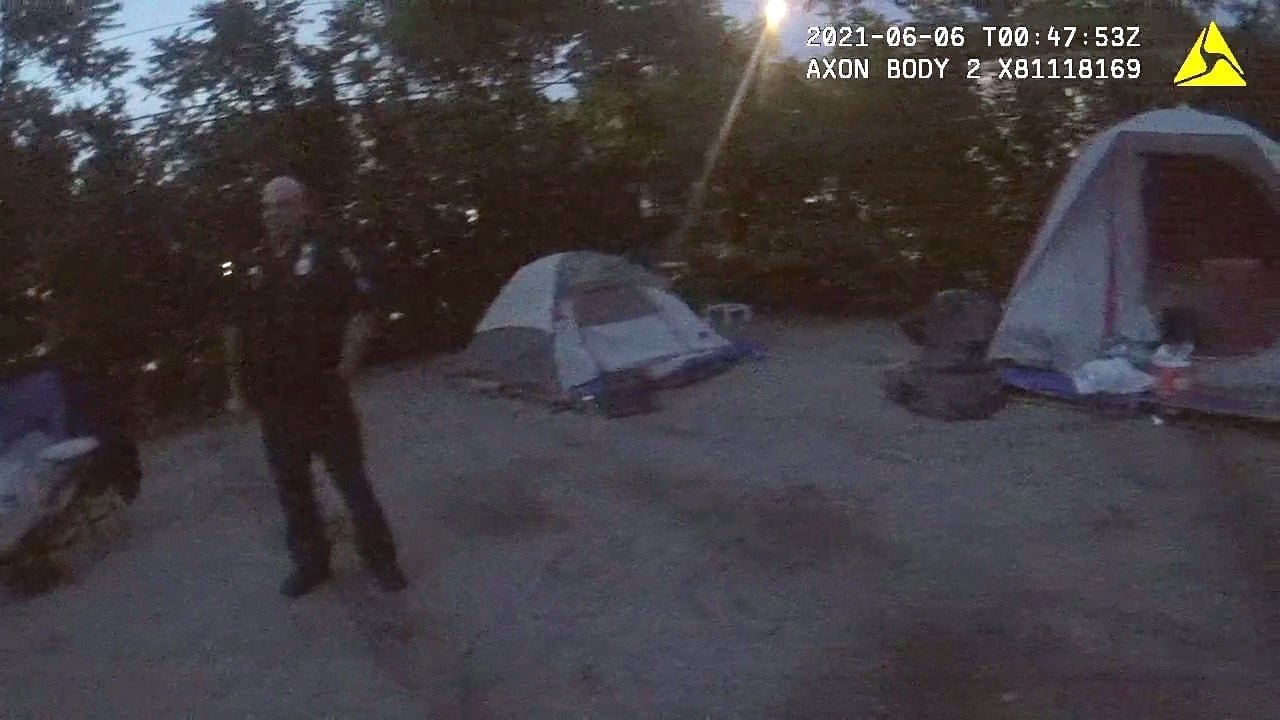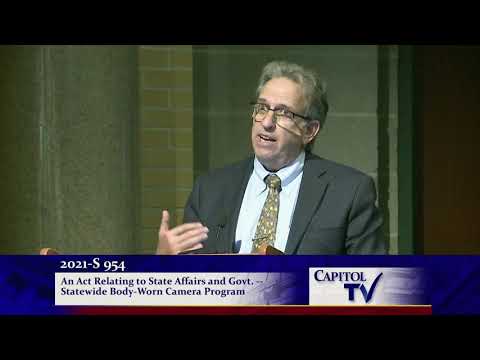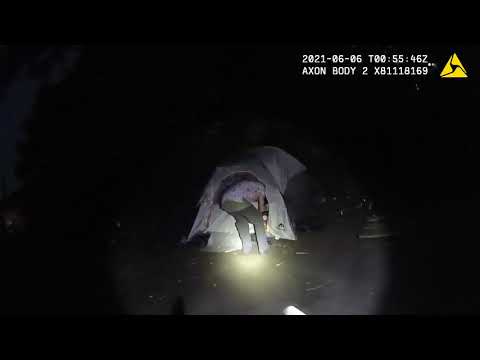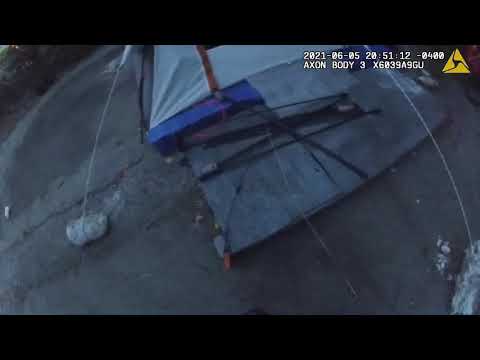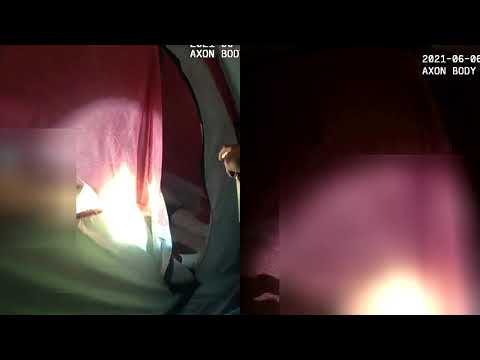PVD Police release video of unhoused encampment visit
“I believe that once this video is released, it could potentially be national training video on how to handle a situation like that,” said State Senator Joshua Miller. “They were called by the neighborhood to respond to certain complaints about what had happened in the homeless encampment – To every person they encountered in there the compassion was tremendous.”
July 20, 2021, 7:28 pm
By Steve Ahlquist
The Providence Police Department has complied with an Access to Public Records (APRA) request from UpriseRI and released two redacted videos from June 6, 2021 in which two Providence Police Officers rousted unhoused people at an encampment off Broad Street in which they searched tents, checked for warrants and threatened people with arrest.
The visit at the camp lasted about half an hour. Uprise RI wrote about the encampment visit here: Providence Police search unhoused encampment – threaten arrests
During the Rhode Island State Senate hearing on legislation to provide body cameras for all Rhode Island police officers, Senator Joshua Miller (Democrat, District 28, Cranston) rose to say that the behavior he saw on these videos, which he saw prior to their release to UpriseRI, was the kind of policing behaviors that will “make you proud of police that have been properly trained and have an incredible amount of compassion.
“I believe that once this video is released, it could potentially be national training video on how to handle a situation like that. They were called by the neighborhood to respond to certain complaints about what had happened in the homeless encampment – To every person they encountered in there the compassion was tremendous.”
Updated (July 21, 2021)
Senator Miller reached out via email. Here is the conversation between Uprise RI and Senator Miller:
Senator Joshua Miller: Either the police or others edited almost all the interaction I found commendable. They reassured almost everyone at tents or elsewhere, when approached, that no one was going to be arrested, they’re checking to make sure you’re ok. Everyone was reassured, even if recognized as having a warrant or drugs being visible, that they were not there to arrest, that they were responding to neighbors complaining.
UpriseRI: Just to say, the videos are presented exactly how the police gave them to me. There are no breaks in the videos.
Senator Miller: Then they redacted the sound and imagery when they encountered people in the tents, either knew or asked people who they were, then carefully explained to each one they were not arresting anyone.
UpriseRI: Do you think that the entirety of their behavior reflects well on their professionalism? Do you think threatening arrests for speaking out against what the residents saw as harassment was professional? Would you still use this video as training?
I think your statements on the Senate floor grossly mischaracterized their conduct. Or, at the very least, was highly selective.
Another idea- Perhaps the police presented video to your group that presented them in a favorable light. Perhaps the police lied to your advisory group.
Senator Miller: They didn’t lie. They were sincere in their concern for several people as they ID’d them, reassured them repeatedly that no-one would be arrested.
Here’s the video:
Police at Unhoused Encampment 1
Police at Unhoused Encampment 2
Police at Unhoused Encampment – Combined
“Hello,” said an officer, after pushing his way through a chain link fence door that protects the community from outsiders. “Does anybody have permission to be on this property?”
“We are currently trying to find the owner,” replied Diumila Almonte, the leader and spokesperson for the encampment.
“Okay,” replied the officer. “What gives you the right to be on the property then?”
Note: At the time the police were demanding papers from residents of the encampment, 390 people were living outside in “places not meant for human habitation” according to the Rhode Island Homeless Management Information System. Add to this the 212 people experiencing homelessness in government supported hotels as of June 5, the 320 in active family shelters, and the 549 individual shelters. 657 people, 326 being families with children, are on a waiting list for shelter. Between January 1 and May 27, 225 people were referred for a housing subsidy, 87 people actually got one, and only 35 people were able to use the housing subsidy towards shelter.
Where can an unhoused person go if they cannot rent or own property? The people setting up tents on an empty lot in Providence have no legal place to live. They are literally criminalized for their poverty.
“You have contact with the owner of this property?” asked the officer.
“So you guys just decided to go on someone’s private property and start erecting things?” asked the second officer.
The officers then proceed to go from tent to tent, demanding identification from those inside, who were sleeping or otherwise minding their business.
Almonte told the officers that they were acting on the unfair assumption that unhoused people all have warrants out for their address. A police officer replied with a threat:
“Oh, I’m assuming stuff now. That’s what you think? Well you are on private property, so it’s time to go. How about we just start kicking feet and grabbing your stuff and leaving?”
“You don’t need to get in my face,” said Almonte.
“Oh, I’m in your face right now? I can get in your face if I want to,” responded the officer.
Told that there were syringes in the encampment, Almonte asked the officer to point them out.
“Are you for real?” asked an officer before dismissing Almonte with a wave of his hand. “Be gone.”
Accused of starting fires, Almonte told the police officer he was lying.
“You are so close,” said the officer. “You are this close to getting arrested for disorderly conduct. You’re very close. Don’t challenge me on it because you’ll be in handcuffs in a second.”
“I have the freedom to say whatever I want,” said Almonte, correctly identifying her first amendment right to free speech.
“You do,” agreed the police officer. “And I have the right to be a complainant for disorderly conduct and I will place you into custody and I will put you in jail.”
“So you guys can lie about things…” said Almonte. “Wrongly accuse people of stuff, get in their faces…
“I will take you to jail,” said the officer.
“Did I get in your face?” asked the second officer, towering over Almonte. “Are you on private property? Is this your property? Do you have permission to be on this property?
“What are you waiting for? Do you or don’t you have permission to be on this property?” badgered the officer. “What are you waiting for to answer that question?”
“She knows she doesn’t,” said his partner.
Later, answering a resident afraid of being kicked out, the police officer said, “No one owns [the property]. We’re not going to kick you out of here, but whoever’s telling you you can stay here is full of it.”
Activist Gregory Waksmulski asked the officers if they have a complaint form the property owner, the police officer admitted that they did not. “Then I have to ask you to desist from harassing us.”
“No,” answered the police officer.
“Then where do we go from here?”
“Nowhere,” said the officer.
A third and fourth officer who arrived on the scene did not have body cameras activated.



